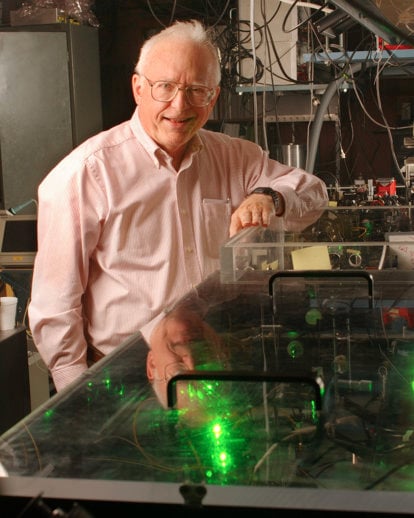John L. Hall
Interview
Interview with the 2005 Nobel Laureate in Physics, John L. Hall, at the 58th Meeting of Nobel Laureates in Lindau, Germany, July 2008. The interviewer is Adam Smith, Editor-in-Chief of Nobelprize.org. Also present is John Hall’s wife, Mrs Lindy Hall.
John Hall explains why precision measurement is the tool for investigating nature’s laws, and why the National Institute of Standards and Technology is such a hotbed of creativity (13:02). He is then joined by his wife Lindy and the two discuss their many partnerships, including working together to select candidates for Dr. Hall’s lab (24:53) and working to provide engaging educational tools for 3rd grade children in the United States (36:57).
Interview with the 2005 Nobel Laureates in Physics, Roy J. Glauber, John L. Hall and Theodor W. Hänsch, 6 December 2005. The interviewer is Joanna Rose, science writer.
The Laureates talk about how they started in science, the Nobel Prize (5:15), their discoveries and the frequency comb technique (11:57), differences in doing science in the USA and Europe (17:58), their theories about light (20:58), and problems still to be solved (27:45).
The Nobel Laureates of 2005 met at the Bernadotte Library in Stockholm in December 2005 for the traditional round-table discussion and TV show ‘Nobel Minds’. The programme presenter is Nik Gowing, principal programme anchor for the BBC’s international television news channel BBC World. Among other things the Laureates talk about competition versus co-operation and the need of mentoring in scientific research.
Telephone interview with John L. Hall after the announcement of the 2005 Nobel Prize in Physics, 4 October 2005. The interviewer is Joanna Rose, science writer.
Interview transcript
– This is John Hall.
– Hello. My name is Joanna Rose. I’m calling from Nobelprize.org which is the official website of the Nobel Foundation. My congratulations on the Prize.
– Thank you!
– How does it feel?
– It’s completely amazing. I hadn’t … of course, expected it or even contemplated it. So it’s a big surprise.
– How come you did not expect to receive the Prize?
– As I’m … rewarded hugely by the chance to be employed and keep building nice tools, that somehow fit together with the ones that I made last week or a month ago; and one is getting the possibility to see … better and better ways to make super-precise measurements. That’s the driver for me; and to be paid to do that as a salary is a great benefit; and to win a prize for it is … I mean, beyond astonishing.
– You have never thought about it? Do you think about Nobel Prizes?
– I have seen a few cases, where people have packed it by that and I’ve thought that there was some slightly different way of our earth collectively bringing rewards to people and organise anything which is worth noticing is the result of many people, and that builds on the tradition that some other people have made it. One of the key things is to be active, have a long working life – and one can feel that! It’s just that … Anyway the Nobel Prize is completely marvellous. It’s … not seriously contemplated by me before.
– I see. How will you celebrate?
– Oh, I will take my best wife out for lunch today, I think.
– It’s very early in the morning, isn’t it?
– Yes, it surely is. It began at three a.m.
– And you received the call in the middle of the night.
– Right. So I have of course read some other people’s experience – to receive a call in the middle of the night. I certainly didn’t personalise that myself. But it did happen!
– What will you say to other people about that?
– I hope that, by the time I get fully wide awake, to have some nice quotable remarks. But, just at the moment, I’ll be still just coming back to life for the next day.
– Yes. Thank you very much for this short conversation and I’m looking forward to meeting you here in Stockholm in December …
– I have appreciated the elegant and useful website which your organisation makes. There’s a need for communicating with young people about what is happening in science; and many of the articles in that, that are accessed from that, are just perfect for high-school people that sometimes come by and they’re not quite /—/ – they don’t see the whole future.
– Thank you very much. That’s great to hear.
– Yes, it really has been helpful … We captured – you and me together – we captured back at least one person that was clearly not on a good track. So I feel quite happy about that. Clearly it’s that the principle role of an adult is to put back into the society the love and investment that they made in him, or her.
– Yes. Thank you very much; and see you in Stockholm soon.
– Okay. Thank you.
– Bye-bye.

John L. Hall.
Photo: Larry Harwood, University of Colorado.
High resolution image for download (jpeg 1.38 MB)
Did you find any typos in this text? We would appreciate your assistance in identifying any errors and to let us know. Thank you for taking the time to report the errors by sending us an e-mail.
Nobel Prizes and laureates
Six prizes were awarded for achievements that have conferred the greatest benefit to humankind. The 14 laureates' work and discoveries range from quantum tunnelling to promoting democratic rights.
See them all presented here.
